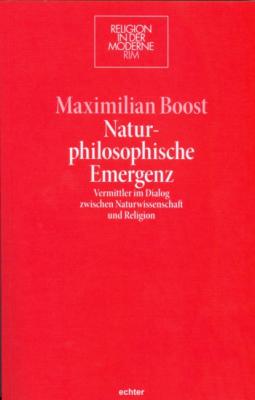ТОП просматриваемых книг сайта:
Naturphilosophische Emergenz. Maximilian Boost
Читать онлайн.Название Naturphilosophische Emergenz
Год выпуска 0
isbn 9783429060459
Автор произведения Maximilian Boost
Жанр Документальная литература
Серия Religion in der Moderne
Издательство Bookwire
Wie auch Markus Eronen konstatiert, ist davon auszugehen, dass beide Interpretationen zutreffen. Schließlich war der Britische Emergentismus nicht philosophisch falsifiziert worden, sondern geriet aus den genannten Gründen einfach aus dem Fokus der Philosophie.190 Dennoch wurde er in kleinerem Rahmen bis in die 60er Jahre hinein gelegentlich in Aufsätzen kritisch rezipiert191, bis – wie Kim schreibt – das Scheitern des positivistischen Reduktionismus, wie auch des Ideals der Einheit der Wissenschaften evident war:
„But the idea of emergence refused to die, continuing to attract a small but steady stream of advocates from both the philosophical and the scientific ranks, and it now appears to be making a strong comeback. This turn of events is not surprising, given the nearly total collapse of positivistic reductionism and the ideal of unified science which was well underway by the early ’70s. The lowly fortunes of reductionism have continued to this day, providing a fertile soil for the reemergence of emergentism.“192
Die ‚Reemergenz‘ des Emergenzbegriffs finde seither ungebrochen statt:
„The return of emergentism is seldom noticed, and much less openly celebrated; it is clear, however, that the fortunes of reductionism correlate inversely with those of emergentism […]. It is no undue exaggeration to say that we have been under the reign of emergentism since the early 1970s.“193
61 Vgl. Stephan (1999b). S. 6-7. Vgl. exemplarisch für frühe mechanistische Positionen: Descartes, René (1637). Von der Methode (Discours de la méthode pour bien conduire sa raison, et chercher la verité dans les sciences). Hamburg: Felix Meiner Verlag 1960. Besonders: S. 33-48 und Hobbes, Thomas (1658). Grundzüge der Philosophie. Zweiter und dritter Teil. Lehre vom Menschen und vom Bürger. Bd. 158. Hamburg: Verlag Felix Meiner 1918. Besonders: S. 1-58. Vgl. für spätere mechanistische Positionen: Diderot, Denis (1751). Philosophische Schriften. Bd. 1. Berlin: Aufbau Verlag 1961. Besonders: S. 289-303 und d‘Holbach, Paul-Henry Thiry (1821). Système de la nature – ou de lois de monde physique et du monde moral. Reprographischer Nachdruck. Band 1-2. Hildesheim: Georg Olms Verlagsbuchhandlung 1966. Vgl. für eine frühe vitalistische Position: Stahl, Georg Ernst (1695). Über den mannigfaltigen Einfluß von Gemütsbewegungen auf den menschlichen Körper. Sudhoffs Klassiker der Medizin. Bd. 36. Leipzig: Ambrosius Verlag 1961. Vgl. für eine spätere vitalistische Position: Driesch, Hans (1916). Wirklichkeitslehre – Ein metaphysischer Versuch. 3. Aufl. Leipzig: Verlag von Emmanuel Reinicke 1930.
62 Vgl. Stephan (1999b). S. 3-4 und S. 6-13.
63 Vgl. Alexander (1920). S. 14 und Lloyd Morgan (1923). S. 9. Vgl. besonders Stephan (1999b). S. 3-4.
64 Vgl. Broad, Charles Dunbar (1921a). „Prof. Alexander’s Gifford Lectures“. Mind. New Series. Vol. 30. No. 117. S. 25-39, Broad, Charles Dunbar (1921b). „Prof. Alexander‘s Gifford Lectures“. Mind. New Series. Vol. 30. No. 118. S. 129-150 und Broad, Charles Dunbar (1925). S. 58 und S. 648-649. Vgl. besonders Stephan (1999b). S. 4.
65 Alexander (1920). S. 45.
66 Alexander (1920). S. 50.
67 Alexander (1920). S. 345.
68 Vgl. Alexander (1920). S. 45-70.
69 Vgl. Alexander (1920). S. 428.
70 Alexander (1920). S. 45.
71 Alexander (1920). S. 46.
72 Alexander (1920). S. 46-47.
73 Alexander selbst spricht vom ‚Laplacean calculator‘. In der Übersetzung des ‚Laplacean calculators‘ als ‚Laplacescher Dämon‘ wird Stephan gefolgt [Vgl. Stephan (1999b). S. 30.].
74 Vgl. Stephan (1999b). S. 47.
75 Alexander (1920). S. 73.
76 Alexander (1920). S. 45.
77 Vgl. Stephan (1999b) S. 47-48.
78 Alexander (1920). S. 328.
79 Alexander (1920). S. 73.
80 Vgl. Stephan (1999b) S. 49-50.
81 Lloyd Morgan (1923). S. 1.
82 Vgl. Lloyd Morgan (1923). S. 2-3.
83 Lloyd Morgan (1923). S. 3.
84 Lloyd Morgan (1923). S. 8-9.
85 Lloyd Morgan (1923). S. 8.
86 Lloyd Morgan (1923). S. 5-6.
87 Broad (1925). S. 61.
88 Broad (1925). S. 65.
89 Broad (1925). S. 64-65.
90 Broad (1925). S. 71. Broad begründet an gleicher Stelle, warum er den Laplaceschen Dämon durch den mathematischen Erzengel ersetzt. Scheinbar sieht er im Fall des Laplaceschen Dämons mathematische Schwierigkeiten, die für diesen trotz vollständiger Kenntnis aller Strukturen und Gesetze in der Praxis gegeben seien.
91 Broad (1925). S. 71.
92 Broad (1925). S. 71-72.
93 Vgl. Broad (1925). S. 72. Dies lässt sich als sehr frühe Form des ‚knowledge argument‘ betrachten, welches später von Thomas Nagel [Vgl. Nagel, Thomas (1974). „What Is It Like to Be a Bat?“. The Philosophical Review. Vol. 83. No. 4. S. 435-450.] und Frank Jackson [Vgl. Jackson, Frank (1982). „Epiphenomenal Qualia“. The Philosophical Quarterly. Vol. 32. No. 127. S. 127-136.] vertreten wurde. Siehe auch Abschnitt 9.1 und vgl. Stephan (1999b). S. 186.
94 Broad (1925). S. 72.
95 Vgl. el-Hani, Charbel Nino/Antonio Marcos Pereira (2000). „Higher-Level Descriptions: Why Should We Preserve Them?“ in: Peter Bøgh Andersen/Claus Emmeche/Niels Ole Finnemann/Peder Voetmann Christiansen (eds.). Downward Causation: Minds, Bodies and Matter. Aarhus: Aarhus University Press. S. 118-142.
96 Vgl. Clayton, Philip (2004). Mind & Emergence – From Quantum to Consciousness. Oxford: Oxford University Press. S. 60-62.
97 Vgl. Brüntrup, Godehard (1996). Das Leib-Seele-Problem – Eine Einführung. Stuttgart/Berlin/Köln: Verlag W. Kohlhammer. S. 66-70.
98 Vgl. Stephan (1999b). S. 15-65.
99 Vgl. Stephan (1999b). S. 14-16.
100 Vgl. Stephan (1999b). S. 15-16. Siehe hierzu auch Abschnitt 4.4.4.2.
101 Vgl. Stephan (1999b). S. 16 und S. 19-20 sowie Brüntrup (1996). S. 69.
102 Vgl. Stephan (1999b). S. 17-18.
103 Vgl. Stephan (1999b). S. 20.
104 Broad, Charles Dunbar (1933). Examination of McTaggart‘s Philosophy. Vol. 1. Reprint. New York: Octagon Books

